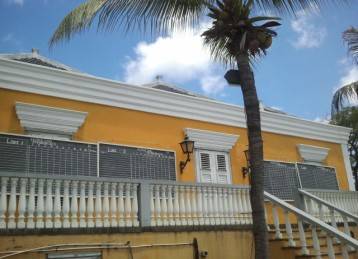Elections of the Island Councils
As of 10 October 2010, the islands of Bonaire, St Eustatius and Saba have become part of the Netherlands as the Caribbean part of the Netherlands. In consequence, the Dutch Electoral Act has from that date come to apply to all elections on these islands. The most recent elections to the island councils were held on Wednesday, 15 March 2023.

Island Councils
The Island Councils are the bodies of elected people's representatives of each of the public bodies of Bonaire, St Eustatius and Saba - and previously of each of the island territories of the Netherlands Antilles. The Island Council supervises the island's Executive Council, which is composed of a lieutenant governor and several members. The Island Council may be compared to the municipal council. Like the municipal council, the Island Council is elected directly for a period of four years.
Number of members
The number of members of the Island Council differs per island. There is is always an odd number, however.
- Bonaire: 9 seats
- St Eustatius: 5 seats
- Saba: 5 seats
Eligibility to vote
A voter must meet the following requirements to be entitled to cast a vote in the elections to the Island Councils:
- the voter must be 18 years of age or over on election day
- the voter must be a resident of the public body (the island) on nomination day.
Electoral districts, principal and central electoral committees
For the purpose of the three Island Council elections, the territory of each of the islands forms a single electoral district. In addition, each island has a single principal electoral committee, also acting as the central electoral committee.
This principal/central electoral committee fulfils the following duties related to the elections procedure:
- Registration of the appellations of political parties
- Nomination
- Determination of the election results
- Filling of vacancies
The principal/central electoral committee is composed of five members, including a presiding officer and a deputy presiding officer. In addition, three deputy members are appointed. The lieutenant governor acts as presiding officer. The island's Executive Council appoints the members and deputy members of the principal/central electoral committee for the elections to the Island Council for a period of four calendar years.
Registration of political parties
Local political parties desiring to participate in the elections to the Island Council under a particular name (legally referred to as: appellation) are required to have this appellation registered with the central electoral committee of the island concerned.
Nomination
On nomination day, all political parties submit their list of candidates to the island's Executive Council Office at the island where they wish to participate in the elections.
Deposits
Political parties not represented in the current Island Council must pay a deposit of USD 225 to be able to nominate candidates. This deposit must be paid into an account of the public body specifically opened for this purpose. The deposit will be refunded if the party manages to achieve at least 75% of the electoral quota or if the party failed to submit a valid list of candidates.
Polling stations
Regular polling stations are open from 7.30 a.m. till 9.00 p.m. Only special polling stations may open their doors at an earlier time. No station may be open after 9.00 p.m. The Executive Board has a duty to ensure that no fewer than 25% of the total number of polling stations are accessible to voters with an impairment.
Casting a vote
Everyone in Bonaire, St Eustatius and Saba eligible to vote will receive an invitation to cast their vote sent to their home address no later than fourteen days prior to election day. This invitation includes their poll card. The poll card allows the voter to cast their vote in the polling station of their choice within the island's borders.
Voting by proxy
Voters may authorize someone else to vote on their behalf on election day. This is called voting by proxy. Voting by proxy is possible by either of the following two methods. A voter may grant another voter the authority to vote in their place by the transfer of their poll card. The initial wish to grant this authority must be the voter's, not that of a political party or a candidate, for example. Electoral treating is a punishable offence. When granting written proxy, the voter submits a written request to have another voter be granted the authority to vote in their place to the lieutenant governor (the Executive council Office). When having been granted the authority to vote in someone's place by that other voter's transfer of their poll card, the voter casting the vote must present a copy of that other voter's identification.
Identification
All voters casting their vote must show identification to identify themselves. Any such identification may not have been expired by more than five years on election day.
Election results
Shortly after the elections, the principal/central electoral committee determines the results and the allocation of the seats. The results of the elections to the Island Councils are stored in the Electoral Council's election results database.
Appointments
The Island Council members of each island are appointed by that island's central electoral committee. Once it has been determined that a particular candidate was elected, the Island Council assesses whether this candidate may hold a seat as a member of the Island Council. In its assessment, the Council verifies whether the candidate meets the requirements for membership, and whether they do not perform any ancillary activities incompatible with being a member of the Island Council. This assessment is referred to as the examination of credentials.
Provincial council and Water authority elections
Simultaneously with the Island Council elections in the Caribbean part of the Netherlands, the European part of the Netherlands elects the members of the provincial councils and of the governing board of the Water authorities. Please refer to the pages on the elections to the provincial councils and the Water authority elections for further information on those elections.